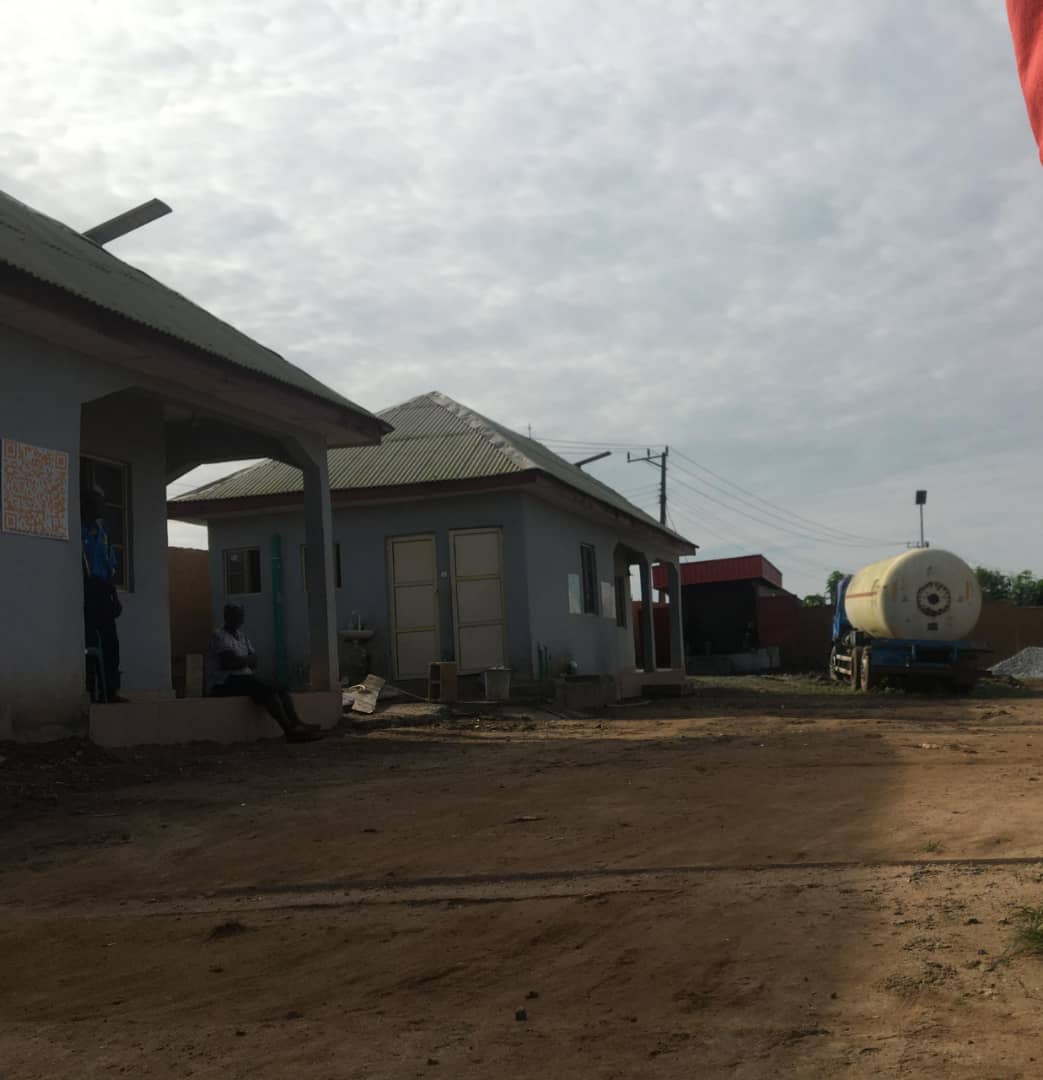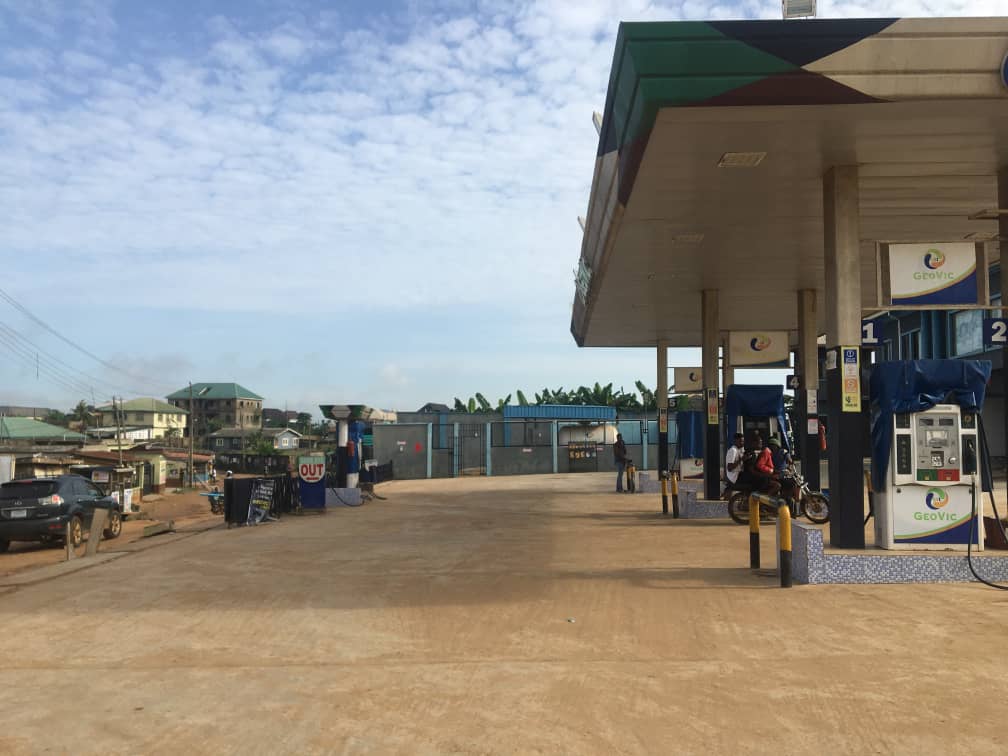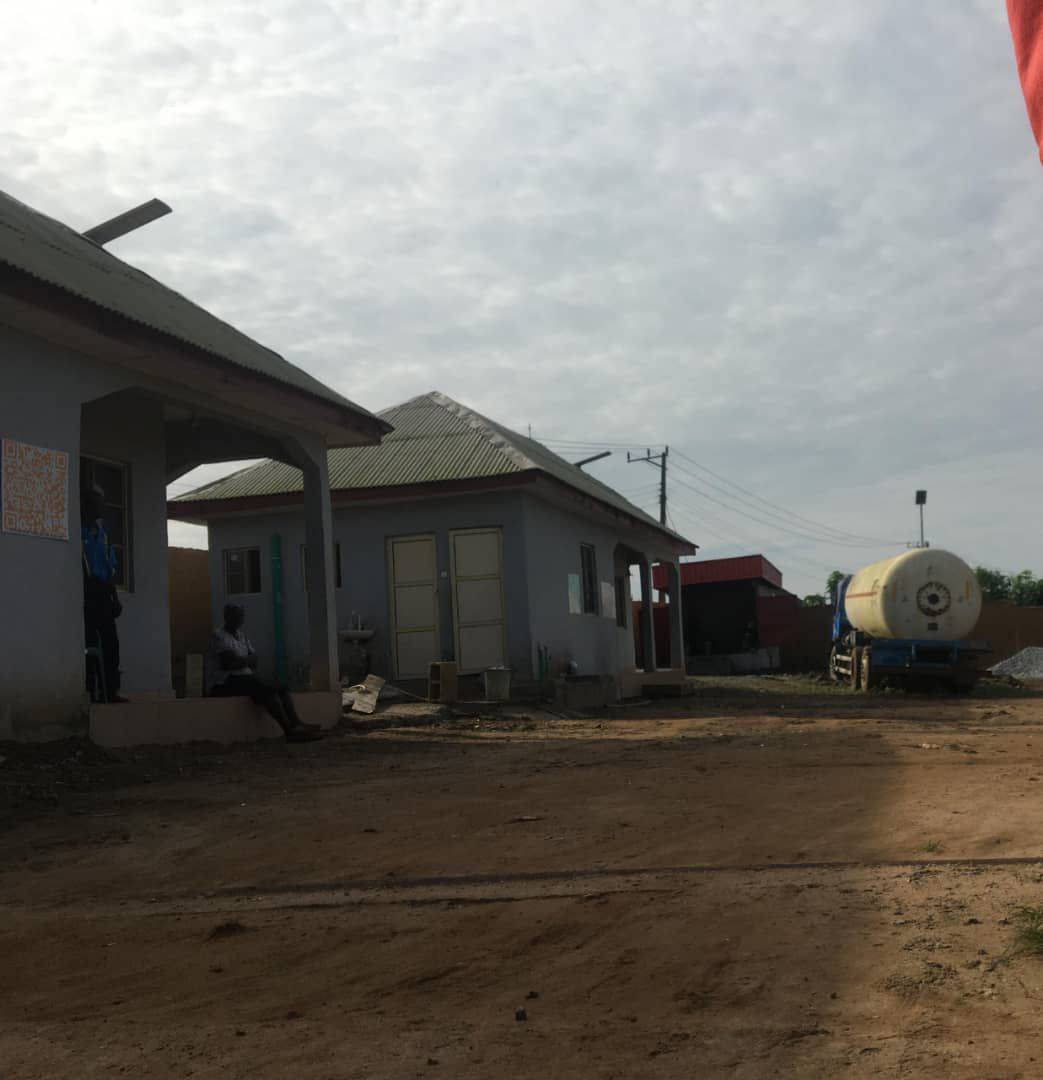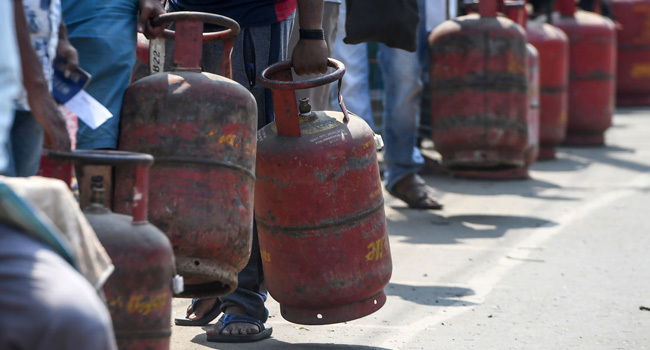In many Nigerian homes, kitchens are quiet, as empty gas cylinders sit unused and the usual sound of burners has been replaced by the crackle of charcoal and the smoke of firewood due to the labour dispute between Petroleum and Natural Gas Senior Staff Association of Nigeria (PENGASSAN) and the management of Dangote Refinery.
From Lagos to Kaduna, what began as a brief supply disruption has spiralled into a nationwide crisis. As the shortage of cooking gas worsens, prices continue to rise in major cities, and queues now snake around gas stations as residents jostle for refills, some paying bribes to attendants, others returning home with empty cylinders.
Despite the Dangote Refinery’s recent price slash aimed at easing the pressure, the cost of liquefied petroleum gas (LPG) continues to soar. At some retail outlets in Lagos, a kilogramme of cooking gas now sells for between ₦2,000 and ₦2,700, more than double the cost just weeks ago.
For many Nigerians, cooking a simple meal has become a daily struggle between survival and scarcity. And the consequences are not far-fetched- continued deforestation, greenhouse gas emissions and climate change. The development will, no doubt, increase the risk of environmental degradation, and it poses significant health risks due to household air pollution.
The Genesis
The last two weeks have seen widespread public outcry over the scarcity of cooking gas, an essential for millions of Nigerian households and businesses.
On 28 September, the Dangote Refinery laid off 800 workers for associating with unions, triggering an industrial action by PENGASSAN.
The strike halted the loading and distribution of lLPG nationwide for several days, creating a bottleneck in supply and what NNPC’s Group CEO, Bayo Ojulari, called an “artificial scarcity.”
Although the strike was suspended on 1 October following government intervention, Mr Ojulari explained that it would take time for supply and distribution to normalise, leading to the temporary price surge seen across the country.
On 6 October, in response to public pressure, the Dangote Refinery slashed its LPG price from ₦810 to ₦760 per kilogramme. However, other depots, including Adova, Matrix, NIPCO, and Stockgap continued selling between ₦910 and ₦950 per kilogramme.
Despite the reduction, retail prices have remained high, sustaining public outrage.
READ ALSO: INVESTIGATION: Five years after fatal Lagos explosion, encroachers bribe way back to ‘danger zone’
Scenes from Lagos: Queues, bribes and frustration
At a depot in Yaba, buyers say they are charged an extra ₦1,000 just to get served. Prices have climbed beyond ₦2,000 per kilogramme in some neighbourhoods, forcing low-income families to revert to firewood and charcoal.

In Ketu, residents like Omowunmi say the impact has become deeply personal. She lamented that she had not been able to cook proper food for two days since her gas ran out unexpectedly.
“I finally decided to buy charcoal and use a neighbour’s coal pot to cook for my family,” she told DevReporting. I spent the whole of yesterday (Thursday) looking for where to refill my gas despite rumours that it was being sold at ₦2,700 per kilogramme, but it was never available. The depot kept saying there was no supply.”
In the Shomolu–Bariga axis, long queues were sighted at gas stations. Retailers sold for ₦2,000 per kilogramme, while G&G Filling Station at Pedro sold at ₦1,500 per kilogramme up from ₦1,000 to ₦1,200 previously.
A buyer, who identified herself simply as Jesufunto, said she joined the queue by 8:00 a.m. and was number 149. “The station now dictates how much each person can buy between 1kg and 5kg,” she said. “Though people can bring more than one cylinder as long as the total doesn’t exceed 5kg.”
Another buyer, Oluwaseun Johnson, said he had been on the queue for over three hours.
“One of the attendants told me I could fill more than 5kg if I tipped the person in charge,” he said.
Similarly, Ayedun Ajoke, who lives around Yaba, said the shortage had crippled her ability to cook and run her small plantain chips business.
“My children will soon be back from school, and I can’t cook because there’s no gas. Even my business is on hold. We heard gas prices dropped from ₦1,500 to ₦1,200, but it’s still not available because of long queues,” she lamented.
Tension was visible at several stations, with reports of minor fights as frustrated buyers struggled to maintain their queue positions.
DevReporting gathered that a clash erupted at a filling station in Lawanson after a dispute over a gas cylinder. Residents said the chaotic scenes reflect growing impatience and poor regulation of sales.
More worrisome were children who should be in school but were standing on the queue, while some workers and traders abandoned their offices and shops to buy gas.
Residents have therefore called on the government to intervene urgently by ensuring timely supply and curbing bribery and favouritism at filling stations.
Other states mirror the crisis
In Ogun State, prices vary widely. In the Makogi area of Magboro, Geovic filling station sells a kilogramme for ₦1,800, while Sungas sells for ₦1,500. MRS filling station sells for ₦1,760, though our reporter observed that the stations were mostly empty of customers.

Checks around Ile-Ife, Osun State, revealed that some gas stations had no supply, while a few that did sold at ₦2,000 per kilogramme. But in the Ogo Oluwa area of Osogbo, retailers sold at ₦1,400 per kilogramme, while stations sold at ₦1,200.
At Agunbelewo, also in Osogbo, retailers sold between ₦1,700 and ₦2,000 per kilogramme.
In Ilorin, Kwara State, residents in the Tanke area bought at ₦1,300 per kilogramme, while in Kaduna, a resident in Trikania said he bought gas at ₦1,400 per kilogramme from a gas station.
Low-income, household food vendors turn to charcoal
As the scarcity persists, many Nigerians, especially low-income earners and food vendors, have turned to charcoal, which is cheaper and readily available.
Oluwakemi food canteen, a local food restaurant in the Ikorodu area, decried the scarcity of cooking gas and the price hike, describing the situation as a dire economic crisis.
“When will things get better in this country? Now we are being forced to go back to our old ways of life, which we had previously considered a thing of the past,” she said, describing her decision to buy charcoal as a substitute for scarce cooking gas as an unfortunate situation.
READ ALSO: Nourishing Hope: EU boosts Northern Nigeria’s fight against malnutrition with €500,000
A food seller at the Owode Onirin market expressed frustration, saying she had asked her workers to switch to charcoal.
“How much will I sell food with gas bought at ₦2,500 per kilo? Who will buy it if the price is too high?” she asked.
Charcoal sellers across Lagos say they are recording significant increases in sales.
Timilehin Ogunnusi, who runs a charcoal outlet in Ajegunle, said: “Sales have gone up in the last few days. Households and food vendors are buying more. The price hasn’t changed, it’s still ₦13,000 per bag, but people are now buying smaller portions of ₦500 to ₦5,000 depending on what they can afford.”
At Mile 12 market, charcoal suppliers echoed the same sentiment. One supplier, who declined to be named, said: “More people are coming back to buy charcoal. Retailers are restocking more frequently because demand has risen sharply.”
Despite the boom, sellers and consumers alike are urging the government to resolve the gas crisis quickly to ease the growing burden on households and small businesses.

NALPGAM Respond
The Nigerian Association of Liquefied Petroleum Gas Marketers (NALPGAM) has raised concern over the rising prices of cooking gas across the country, saying that the current prices are artificial.
Speaking when he appeared as a guest on Channels Television’s The Morning Brief on Wednesday, the national president of the association, Oladapo Olatunbosun, lamented that the strike that followed the crisis between members of PENGASSAN and the Dangote Refinery had resulted in prices skyrocketing between about ₦1,700 and ₦2,000 per kilogram, depending on the location, and at ₦3,000 in some extreme cases.
According to him, there had been no official price increase, blaming the current price hike on market opportunists.
Mr Olatunbosun said: “I sympathise with Nigerians because we never intended to have a situation like this. I must say categorically that the prices of cooking gas have not gone up. No increment has been done officially.
“What is happening is that some marketers are taking advantage of the shortage in supply and the market forces that have increased demand. They are cashing up to make a lot of money, which is wrong. We frown at this, and I am happy that by the grace of God, normalcy will return in the next few days.”
Reason for temporary artificial scarcity
Mr Olatunbosun explained that about a year and a few months ago, one kilogramme of gas was between ₦1,200 and ₦1,300, but the price recently came down due to the production by Dangote Refinery.
He disclosed that Dangote eliminated middlemen, which he said, made cooking gas to land at a reasonable price. “What actually caused the temporary artificial scarcity and price hike is that before the strike, when you load from Dangote refinery, he sends out about 50 trucks per day, which is good because it served the South West and some parts of the North well.

The official said: “Later, Dangote came in with his own strategy, selling directly to offtakers. That made importation unattractive because you won’t be able to compete if you import. You will rather incur losses. But at one time, Dangote also commenced renovation and maintenance, which affected loading. Then, trucks started spending 14 days at Dangote yard before they could get products. So, marketers switched to Apapa, and nobody felt the impact.
“Just when Dangote finished renovation/maintenance, and we were about to commence full loading, the strike came in. Although Dangote didn’t stop production, everybody had rushed to Apapa, and it was now out of product, and all the depots there were dry. The only vessel that came in from the Nigerian Offshore Jetty (NOJ) axes meant to supply the depot could not berth because of the strike.
“When it eventually berthed, the officers meant to inspect it weren’t on the ground due to the strike, and that caused about five days’ loss, while the real impact of the backlog became obvious. Now that the strike is over, the product has been discharged, and they are trucking out but because everywhere is dry and the South West is the only place that consumes the largest amount of LPG in Nigeria”.
While he noted that Nigeria’s national gas consumption has risen significantly from about 1.3 million metric tonnes per annum two or three years ago to nearly 1.9 million today, he assured that the scarcity would soon ease as products are now being trucked out across the country.
…………..
Contributors: Sodiq Mojibola, Ibraheem Awotunde, Olabisi Sulaiman, Moryam Bakare & Adedoyin Oguntade

